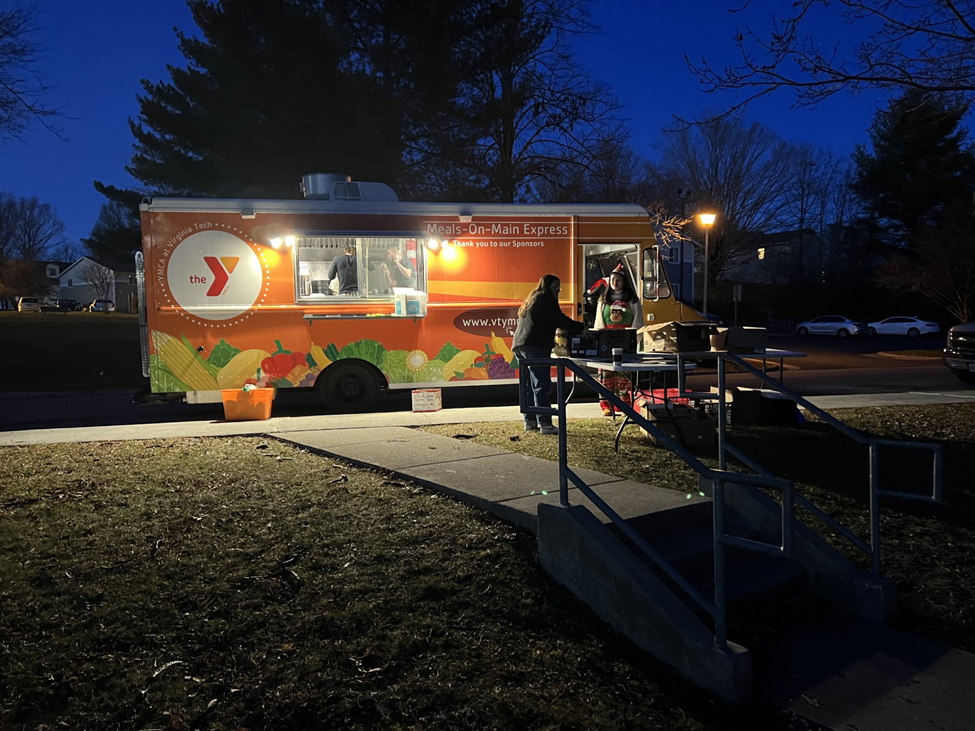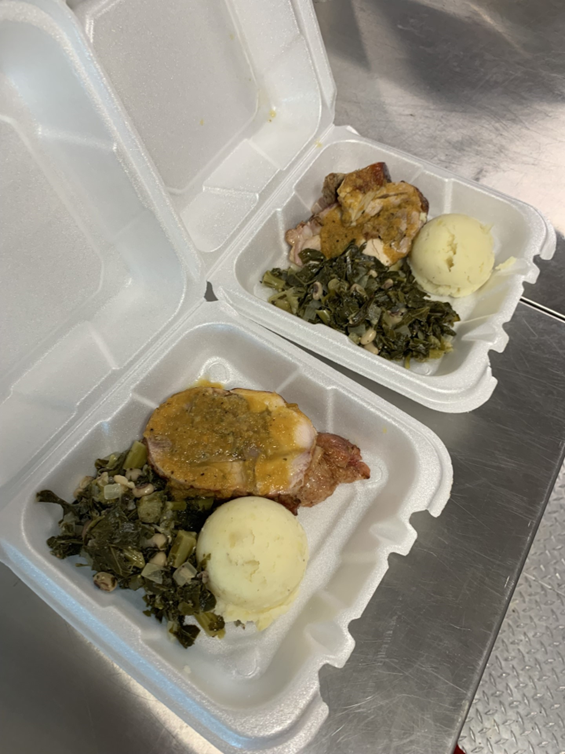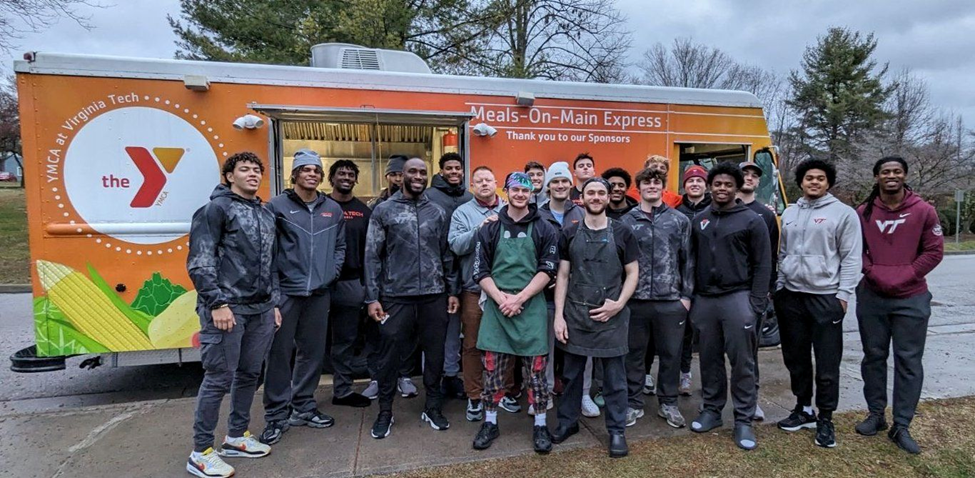Meals On Main
Who We Are
Hey! We're Meals on Main, and we operate a free weekly food truck in Christiansburg, Virginia. Every Tuesday, we take the local YMCA's food truck (affectionately known as Becky) and give out roughly 150 meals. In the last five months (as of April 2024) we've given out over 1300 free meals, all at zero net cost to ourselves or the VTYMCA. We've gotten pretty lucky on our journey to feed people good food for free, but we'd like to share our operational methods, and hopefully help others to create sustainable systems for getting people free/affordable food and serve nutritious, tasty meals.

Becky the food truck, 12/12/23
Our Mission
Hunger is a silent killer. It can be hard to recognize when someone around you is food insecure, and every single one of us knows someone who is. More than one in ten people in the United States (the wealthiest nation on the planet!) are food insecure[1], but what does that really mean? The USDA defines food insecurity as "a household-level economic and social condition of limited or uncertain access to adequate food.[2]" On a day-to-day basis, that looks like not knowing where your next meal is coming from, or even when you'll be able to eat next. It's challenging to live that way, let alone work. To get a better idea of food insecurity rates near you (in the US only, sorry) check out this great webpage from Feeding America, an organization whose goal is collecting and compiling data on food insecurity for public use.
At Meals on Main, we believe in the power of food. It's one of a few "equalizers;" everyone needs food, regardless of their life situation, and everyone should have access to healthy, delicious food. Everyone deserves to have their basic needs met, and we do what we can to provide one of those needs, and build community in the process. We do our best to be available every single Tuesday, rain or shine, to reliably provide at least one meal per week, entirely for free, with almost no questions asked (more on that later).
Our Inspiration
We’re heavily inspired by Food Not Bombs, a group of independent collectives. Each chapter operates independently to share free food to those who need it. The food is usually vegan or vegetarian, so that it’s accessible to as many people as possible, and their core beliefs are as follows (copied from Wikipedia):
· Meals are usually vegan or vegetarian. The Gainesville, Florida, USA chapter, for example, serves meals that include animal products such as chicken, pork chops, brisket, steak and shrimp.[1][2]
· Meals are free to anyone.
· Each chapter is independent and autonomous and makes decisions via consensus.
· Dedication to nonviolence.
· Views "food as a right not a privilege."[5]
From their beliefs, their goals follow logically (copied from Wikipedia):
1. To combat poverty and homelessness[6]
2. To facilitate community gatherings of hungry people
3. To allow anyone to volunteer to help cook, and then eat.[7]
Each collective has little to no contact with other collectives and operates within their own community. It’s easier to get started than you think, and in the United States, there is always surplus food to be found, food that would otherwise go to waste. If this inspires you like it does us, then just do it! Everybody needs food, but not everyone can get the food that they need. Look around your area, and you’ll find people in need.
How We Got Started
A dishwasher and a line cook walk into a bar [kitchen]. It sounds like a joke, but it's where this all started. Seth and Connor (that's us!) met working in the kitchen of a bar/restaurant. Our friendship began with a few book recommendations (namely this one and this one). We realized that we had a lot of shared values, and began cooking up a plan to feed people in the area. Our original intention was to put up a canopy in a parking lot and give out fried rice, at cost to ourselves. We began asking around our town for a parking lot that we could use, and got INCREDIBLY lucky. The local YMCA had a lovely looking parking lot, so we emailed them about using it. Ding! Reply: they have an entire food truck lying around, almost totally unused, and they'd be willing to let us use it to serve food in one of the communities that they already have a program in. And so, Meals on Main was born.
The first meal we served was a holiday meal consisting of turkey stuffed with bread crumbs, mashed potatoes with gravy, and collard greens. Since then, we've served over a thousand more meals, all nutritionally complete and (mostly) well-received by the community. A few of the other meals include beef lasagna, chicken/seafood gumbo, beef birria tacos, and chicken fried rice.

Our first meal, 12/12/2024
A Day on the Food Truck
We serve food every Tuesday, and we always start early. We arrive at the local YMCA around 7:30, and hit the ground running. We retrieve the food we purchased from the Y’s storage fridges, load up the truck, and drive over to the restaurant that we work at by 8am. We both work in the kitchen at the same restaurant, and they graciously allow us to use their equipment and prep space before the rest of the day’s staff arrives (note: if you or someone on your team works in a restaurant, this can be HUGE, and cuts down on a lot of prep time. People are generally willing to help feed people who need it, and this is an easy way for restaurant owners to help without doing any labor).
We get started in the kitchen right away. Any recipe that’s going to require something to simmer for a while is the first thing to get done, namely stews/soups. From there, we work backwards from the parts that will take the longest to the parts that will take the least amount of time, with special emphasis on things that we won’t be able to do once we leave the restaurant kitchen (e.g. anything that requires a food processor, lots of counter space, or other commercial equipment that we don’t have on the food truck). Once the big pieces are squared away, we vacate the kitchen before 11am. Whenever anything needs to be moved from place to place, we take special care in securing all food in food-safe ways. This means heavily plastic wrapping any kind of liquid, storing any dryer elements in our Cambro containers, and securing everything on the food truck against any kind of shifting/movement during driving (lots of bungee cords!). From there, we park back at the YMCA and get the truck hooked up. We’re fortunate to have a lot of built in appliances on the food truck. Becky has two ovens, a flat-top, a six-burner range, and 3 steam table containers, all running on a propane tank secured to the back of the truck. We also have a generator that powers the lights, water pump, hot water heater, fridges, and vent fan.
After parking at the Y, we move into the middle-prep phase. This is where we do what we can on the food truck. For example, when we made beef lasagna we put the lasagnas together on the food truck and started baking them in the ovens, but we made all of the sauce and shredded the cheese at the restaurant. This middle phase is variable in how long it takes, and depending on how much time we have, we’ll start doing the dishes once the time-consuming bits are complete. Sometimes we’ll grab lunch at a local spot and eat it on the truck, and we’re ready to move again by 3pm.
We arrive at the service location by 3:30pm, get the generator and propane running, and enter the final prep phase. At this point, we’re getting everything set for service, and doing any kind of easy, last minute preparations. Usually, that looks like getting everything into the steam tables, working out a plan for putting together meals quickly, and cutting up any fruits that’ll be served with the meal. One of us will take a few minutes to set up a sign outside with that week’s menu and allergens, and a canopy for people to wait under if it’s raining.
We work with the YMCA for many reasons, but the most important piece is keeping this process sustainable. Through the YMCA (or any local government-recognized organization/nonprofit) we have access to the CACFP meal reimbursement program. While we’re setting up the food truck and finalizing preparations for service, the YMCA’s AmeriCorps volunteers are inside with the kids, providing them with approved recreational activities. This is a key requirement for the branch of CACFP that we are reimbursed through, and there’s no way that the two of us could do it without these awesome volunteers.

Virginia Tech Football Special Teams volunteering with Becky!
It's 5pm! Time for service. If all else has gone well, this part goes off with few issues. We do our best to accommodate any kinds of allergies or eating choices (vegan, vegetarian, etc.) on the fly. As we give out meals, we ask only one question of everyone that comes to get food: “How many kids, how many adults?” We only get reimbursed through CACFP for the meals served to people under 18. Generally, we have nearly equal numbers of kids and adults, so we aim for each meal to cost roughly half of the reimbursement per meal, that way we can serve food to adults at no cost. Technically, service is from 5-7pm, but we generally stay 30-60 minutes after 7pm, to catch any stragglers that might have been working or otherwise busy. While we wait for the last few people to trickle in, we get a jump on cleaning the food truck, and pack up around 7:45 (earlier if we give out all of the food we brought).
Upon getting back to the Y, we finish up any miscellaneous cleaning tasks, and group all of the dishes up for easy transport the next day. Our sink space is limited, so we often take the rest of the dirty dishes to the restaurant the next day, and clean them after we finish our shifts for the night. If you’re looking to do something similar, the commercial dishwasher is the single most helpful part of having access to restaurant equipment. Dishes become a 45 minute affair, and we are done for the week.
How It Works
The USDA has a funding program called the "Child and Adult Care Food Program" or CACFP, through which we are reimbursed for all food costs. We operate under a Virginia-specific arm of this program, the "At Risk Afterschool Meal Program." You can find out more here. The requirements vary by state, and eligibility varies by school district, but on this page we'll detail how we do it here in Western Virginia. Chances are good that your state has a similar program with similar requirements.
There are a few requirements that must be met with every meal served, and they are best met in partnership with an established locally-operating nonprofit. If you haven't already guessed, we partner with our local YMCA to meet these requirements. An operation like ours is impossible without their help and resources, particularly
Getting Involved
If you're seeing this page, presumably you're someone looking to improve your local community, and the lives of those around you. Maybe your heart hurts when you see someone whose basic needs aren't met. Maybe you're coming from a more politically aware angle, looking to help those who fell through the cracks of our current system, or maybe you just really like cooking food, and you want to leverage that skill for the good of those around you. Whatever the reason, if you're looking to sustainably give out food for free, you're in the right place. Hopefully our journey can inspire and inform you and a few friends, and we will be updating this wiki regularly, with lots of recipes, free tools, strategies, and general advice. Stay tuned, and check out some other pages while you're here.
Update: 8/30/2024
On August 23, 2024, Seth and Connor received the overall award at the Igniting Connections Symposium for Early Childhood Education from the New River Valley Chapter of the Virginia Association for the Education of Young Children. They received the award for their efforts with Becky the Food Truck. They also created a space for three new full-time positions at the VTYMCA within the food truck program.

No Comments